Covid guidance for Indian variant hotspots ‘amounts to lockdown by stealth’
Almost two million people across eight areas in England are being advised to limit their social interactions indoors and not to travel.

Ministers have been accused of bringing in “local lockdowns by stealth” after quietly slipping out guidance urging people in Indian variant hotspot areas to restrict their socialising and travel.
Labour shadow health secretary Jonathan Ashworth called on the Government to withdraw the new advice for eight areas in England, where it is being recommended that people do not meet indoors and that travelling in and out of the localities should be avoided.
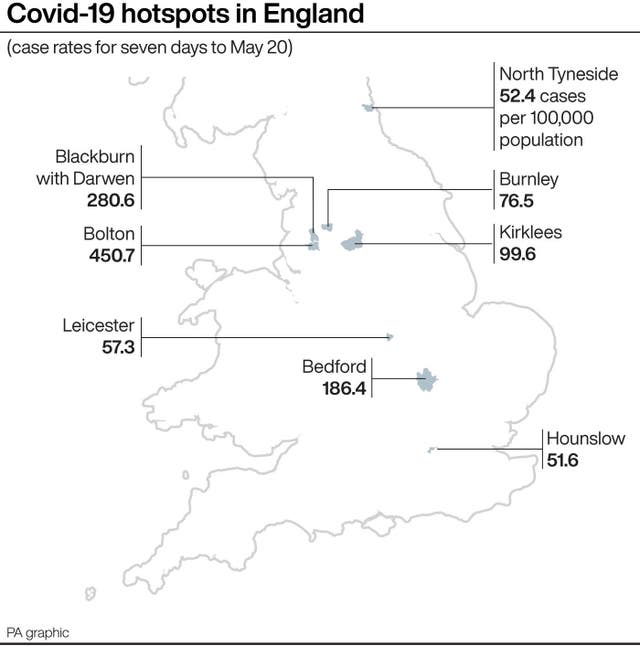
Health chiefs in the areas have said they were not consulted or informed about the changes, which were published on the Government’s website on Friday without a formal announcement.
Demanding answers during an urgent question in the House of Commons, Mr Ashworth said many of the areas involved – with almost two million people across Bolton, Leicester, Kirklees, Blackburn with Darwen, Burnley, Bedford, North Tyneside and the London Borough of Hounslow affected – had “borne the brunt of the crisis these last 15 months” and felt “abandoned” by Westminster.
“So can the minister understand how upsetting it is, can he understand how insulting it is, to have new restrictions imposed upon us?” asked the Leicester South MP.
“Local lockdowns by stealth, by the back door, and the Secretary of State (Matt Hancock) doesn’t even have the courtesy to come and tell us.”
Mr Ashworth urged second doses of vaccines to be rolled out at a faster rate to protect against the highly-transmissible Indian mutation, while calling for ministers to “withdraw this guidance now”.
Downing Street and vaccines minister Nadhim Zahawi, answering the Commons question on behalf of the Government, defended the handling of the battle against the B1617.2 variant, which vaccines being rolled out in the UK have been shown to help guard against.
Mr Zahawi told MPs that the onus was on personal responsibility and that Boris Johnson – who has signalled he does not want to return to locally tiered measures – still intends to take a national approach to lifting restrictions.
“As the Prime Minister said, we want the whole country to move out of these restrictions together and we’re trusting people to be responsible and to act with caution and common sense as they have done throughout this pandemic and to make decisions about how best to protect themselves and their loved ones,” Mr Zahawi said.
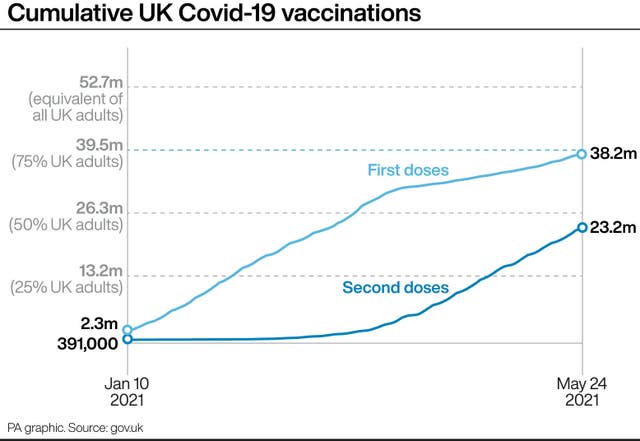
The Government has argued that the recommendations to the hotspot areas were first issued on May 14 – with the Prime Minister urging people to be “extra cautious” – before being “formally” published online last week.
No 10 stressed that the guidance was “not statutory” and that the Government wanted to move away from “top-down edicts” as lockdown eases.
But ministers came under fire for what Mayor of Greater Manchester Andy Burnham labelled a “fairly major communications error” which had caused “huge amounts of confusion”.
In a joint press conference with Mr Burnham, Bolton Council leader David Greenhalgh went even further, saying he believed the fear of local lockdowns – reignited by the latest hotspot advice – had led to an “underlying resentment that can very easily, if we’re not careful, turn into anger”.
A joint statement issued by directors of public health in the eight affected local authorities said: “Following the national coverage of recently revised guidance we have met with national officials and confirmed there are no restrictions on travel in or out of each of our areas: there are no local lockdowns.
“In areas where the new Covid variant is spreading we are all working together to boost testing and vaccination and to support self-isolation.”
In an earlier statement, Leicester’s director of public health said it was a “mistake” to suggest different travel restrictions applied to the East Midlands city.
Arguing that Leicester has “lower rates of the variant than other parts of the country”, Professor Ivan Browne said: “There are no local lockdowns and there is no justification for Leicester to be treated differently to the rest of the country.”
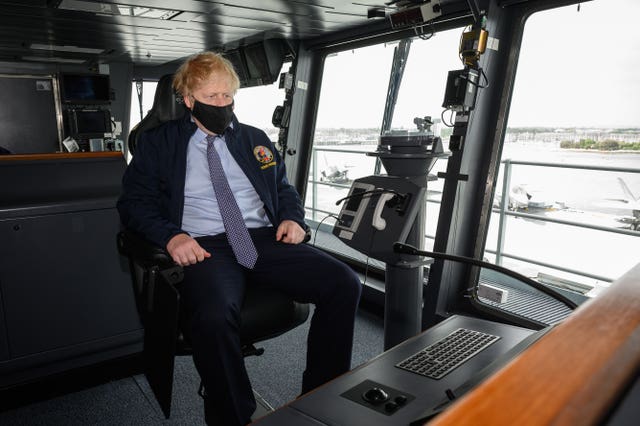
Since May 17, pub and restaurant-goers have been permitted to eat and drink inside and foreign holidays have been allowed.
Bolton’s Mr Greenhalgh told a press conference that people in the North West town should “behave sensibly” and there was no need to “be cancelling holidays”.
It comes as Bolton NHS Foundation Trust said the hospital’s emergency department saw one of its busiest ever days on Monday and that it was braced for continued pressure.
Chief operating officer Andy Ennis said “more people” were turning up requiring treatment from the effects of Covid-19, with 41 currently admitted, including eight in critical care.
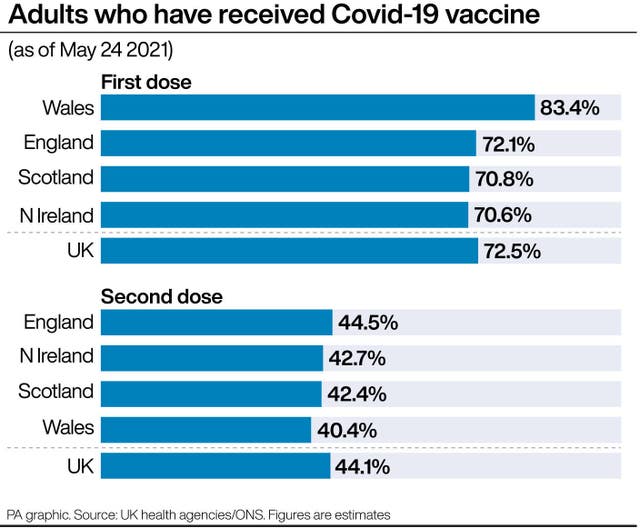
“Going into the bank holiday weekend and half term, which is always a busy time for the NHS, we anticipate this pressure continuing.
“As such we are taking urgent actions to ensure we can continue to manage this demand effectively.”
He urged the public only to attend the emergency department if absolutely necessary.
It follows a slight rise in weekly registrations of deaths involving Covid-19 in England and Wales, according to new figures.
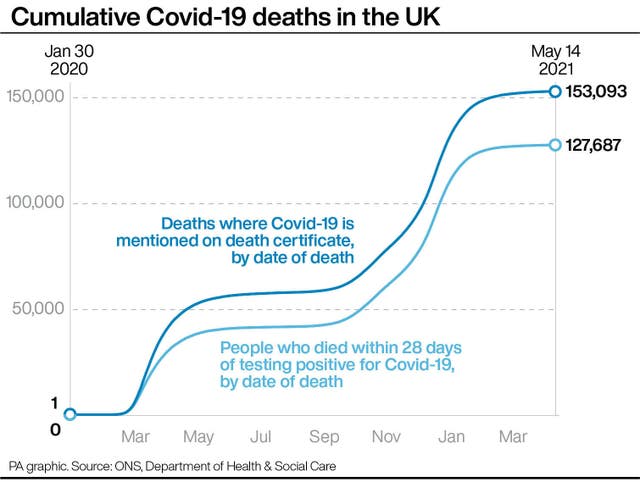
However, the numbers are likely to have been affected by the early May bank holiday.
A total of 151 deaths registered in the week ending May 14 mentioned Covid-19 on the death certificate, according to the Office for National Statistics (ONS).
The figures are up from 129 in the previous week – a rise of 17%.
In related news, Culture Secretary Oliver Dowden hailed the UK’s Covid test event pilots, which included a reduced-capacity FA Cup semi-final at Wembley Stadium and a nightclub opening in Liverpool, as a “real success” after it recorded only 15 positive cases among the 58,000 people who took part.
Mr Dowden told the London Evening Standard the outcome meant he is “hopeful” that June 21 will see the full-scale reopening of theatres and other venues.





